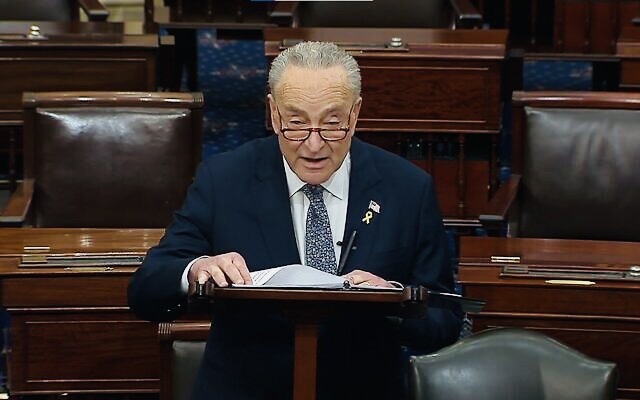Chuck Schumer, the top-ranking Democrat in the U.S. Congress and the Senate majority leader, went out on a limb yesterday, accusing Prime Minister Benjamin Netanyahu of being a major obstacle to peace, calling for a fresh election and a new leadership in Israel, and endorsing a two-state solution.
Schumer’s 40-minute speech was seen as yet another sign of the Democratic Party’s growing pique with Israel’s conduct of its war with Hamas, which erupted after Hamas terrorists killed roughly 1,200 Israelis and foreigners in southern Israel on October 7.
President Joe Biden, whose policy differences with Netanyahu over it have incrementally strained Israel’s relations with the United States, complemented Schumer on his “good speech,” further widening their rift.

Israel’s opposition leader and former prime minister,Yair Lapid, interpreted Schumer’s speech as a troubling sign that Israel, “one by one,” is losing its “biggest supporters in the U.S.”
Schumer, the highest-ranking Jewish politician in American history and a pro-Israel stalwart, took a considerable risk by intervening so boldly in Israel’s domestic politics.
He represents New York, a state with a sizeable Jewish population. Much to his detriment, some pro-Israel Jewish voters may well turn against him in the next election.
And he can be accused of interfering in the affairs of a foreign country, or charged with calling for the overthrow of a democratically-elected government, both of which would be valid arguments.
Indeed, two of his Republican Party colleagues, notably Mitch McConnell and Lindsey Graham, levelled these accusations against Schumer just hours after he spoke.
As expected, Netanyahu’s right-wing Likud Party fired back, saying that Israel is not “a banana republic” that takes its orders from the United States: “Contrary to Schumer’s words, the Israeli public supports a total victory over Hamas, rejects any international dictates to establish a Palestinian terrorist state, and opposes the return of the Palestinian Authority to Gaza. Senator Schumer is expected to respect Israel’s elected government and not undermine it. This is always true, and even more so in wartime.”
Netanyahu’s rival, Benny Gantz, a member of Israel’s war cabinet and a former defence minister, lambasted Schumer’s speech as “a mistake.” While praising him as a “friend who helps us a lot, including recently,” Gantz added, “Israel is a strong democracy, and only its citizens will determine its leadership and future. Any external intervention in the matter is incorrect and unacceptable.”
Schumer delivered his sharp critique more than four decades after Menachem Begin, the then Israeli prime minister, used unusually harsh language to condemn the United States.

In December 1981, Begin summoned the American ambassador, Samuel Lewis, for a dressing down after U.S. Secretary of State Alexander Haig suspended the Strategic Cooperation Agreement with Israel following its annexation of the Golan Heights.
“Are we a vassal state of yours? Are we a banana republic?” Begin declared in response. “Are we youths of fourteen who, if they don’t behave properly, are slapped across the fingers? Let me tell you who this government is composed of. It is composed of people whose lives were spent in resistance, in fighting and in suffering. You will not frighten us with ‘punishments.’ He who threatens us will find us deaf to his threats.”
Schumer made his unprecedented speech on the day the Biden administration imposed a second round of sanctions against Israeli settlers in the West Bank.
Twenty four hours earlier, eight Senate Democrats, including Bernie Sanders but not Schumer, urged Biden to halt the sale of offensive military equipment to Israel if it fails to do more to minimize civilian casualties in Gaza.
In his stark and stern address, the sharpest yet from a U.S. elected politician, Schumer said that Netanyahu has “lost his way by allowing his political survival to take precedence over the best interests of Israel.”
Schumer said that Netanyahu has been “too willing to tolerate the civilian toll in Gaza, which is pushing support for Israel worldwide to historic lows.”

He claimed that Netanyahu’s government “no longer fits the needs of Israel after October 7 … the Israeli people are being stifled right now by a governing vision that is stuck in the past.”
He added, “I believe a new election is the only way to allow for a healthy and open decision-making process about the future of Israel, at a time when so many Israelis have lost their confidence in the vision and direction of their government … As a democracy, Israel has the right to choose its own leaders, and we should let the chips fall where they may. But the important thing is that Israelis are given a choice.”
Schumer said that most Israelis “will recognize the need for change.”
Looking into the future, Schumer echoed the policy of the Biden administration when he said that Israel should resolve its conflict with the Palestinians through a two-state solution. It would consist of “a demilitarized Palestinian state living side by side with Israel in equal measures of peace, security, prosperity and dignity.”
Schumer, however, recognized that the timing might not be right following the trauma of October 7.
Although Schumer’s speech will be castigated by some as far too critical of Israel, he did not call for an immediate ceasefire, nor did he advise Israel to cancel its planned invasion of Rafah, Hamas’ last urban stronghold.

Schumer, too, denounced “radical right-wing Israelis” and Hamas as obstacles to peace and called for the ouster of Mahmoud Abbas, the president of the Palestinian Authority. “For there to be any hope of peace in the future, Abbas must step down and be replaced by a new generation of Palestinian leaders who will work towards attaining peace with a Jewish state,” he said.
It should be noted that Shumer’s comments were in alignment with the views of many Israelis.
According to a recent Channel 13 survey, 53 percent of Israelis think that Netanyahu is primarily motivated by personal interests, while only 33 percent believe he is acting for the good of Israel.
A poll conducted by the Israeli Democracy Institute found that 53 percent of Israelis were unsatisfied with the performance of Netanyahu’s war cabinet.
A Channel 12 survey taken recently found that a potential coalition led by Gantz would secure 69 of the Knesset’s 120 seats, compared to a bloc led by Netanyahu that would win 46 seats. When asked who they favored as prime minister, 41 percent of the respondents said Gantz, compared to 29 percent for Netanyahu.
In recent weeks, Israeli protesters have taken to the streets and called for fresh elections and blamed Netanyahu for having failed to prevent the October 7 massacre.
Clearly, Schumer was not deaf to their complaints and grievances.
